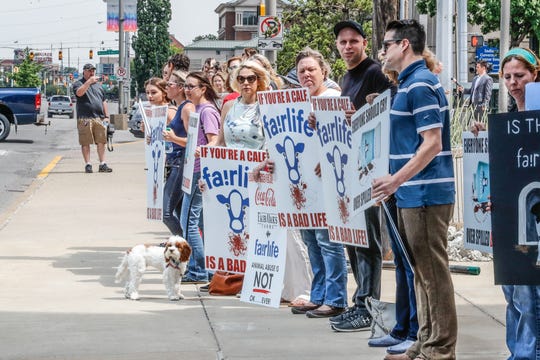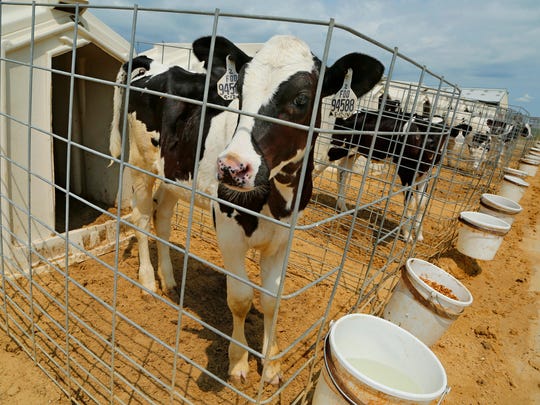Ethics Case Controversy
 Fair Oaks Farms was put under investigation when videos from an undercover investigation showed multiple accounts of abuse with the treatment of the calves on the farm. The Animal Rights Mission investigator had stated that they had collected over 100 hours of footage regarding actions of cruelty towards the calves on the farm. Since the June 4 release of the first of three Animal Recovery Mission’s undercover footage, handfuls of stores have pulled Fair Oaks products off of their shelves. The owners of the farm had said that “he had no choice but to admit had happened on an operation he’d created to be a window into a model dairy farm” (Bangert and Hwang). Fair Oaks Farms was also put on probation by the National Milk Producers Federation. Farms are put on probation until it is proven that the corrective actions to correct the issue, otherwise they will be removed. In Mike McCloskey’s response video to the public, he had mentioned that there were five total employees that were conducting the abuse towards the calves. Between the animal rights protests and the overall reaction from the public, it is fair to say that not many people were okay with the actions taking place and it requires some change. Coca-Cola, one of their main business partners, has also taken action regarding this topic and had started an investigation of their own and looking at the other farms where they get their milk from for the Fairlife dairy products.
Fair Oaks Farms was put under investigation when videos from an undercover investigation showed multiple accounts of abuse with the treatment of the calves on the farm. The Animal Rights Mission investigator had stated that they had collected over 100 hours of footage regarding actions of cruelty towards the calves on the farm. Since the June 4 release of the first of three Animal Recovery Mission’s undercover footage, handfuls of stores have pulled Fair Oaks products off of their shelves. The owners of the farm had said that “he had no choice but to admit had happened on an operation he’d created to be a window into a model dairy farm” (Bangert and Hwang). Fair Oaks Farms was also put on probation by the National Milk Producers Federation. Farms are put on probation until it is proven that the corrective actions to correct the issue, otherwise they will be removed. In Mike McCloskey’s response video to the public, he had mentioned that there were five total employees that were conducting the abuse towards the calves. Between the animal rights protests and the overall reaction from the public, it is fair to say that not many people were okay with the actions taking place and it requires some change. Coca-Cola, one of their main business partners, has also taken action regarding this topic and had started an investigation of their own and looking at the other farms where they get their milk from for the Fairlife dairy products.
Stakeholders
The owners, Mike and Sue McCloskey, are the main stakeholders involved in this case because they are the owners of Fair Oaks Farms. Also, their business partners, Coca-Cola are big stakeholders involved along with the employees at Fair Oaks Farm, the families of the employees, the Animal Rights Mission, the animals that were being abused, and the consumers of Fair Oaks dairy products are some more of the main stakeholders involved in this case.
Individualism
According to individualism, business actions should be made to help maximize the profits of the business. It is their responsibility as a business to engage in activities that are designed to help a company increase its profits legally. The actions taken by the employees in the several videos posted by Animal Rights Mission showed actions that did not lead to any profit for the company. Also, animal cruelty can be charged as a misdemeanor offense, which is an illegal action, making an individualist agree that this case is unethical.
Utilitarianism
According to the Utilitarianism Theory, this case is deemed unethical because the actions of the employees were not aimed at the maximization of happiness for all the beings involved. This includes the animals that are residents on the farm and since they were not only harmed, but killed, that is the worst possible outcome that could have happened. The guilty employees may have not been affected by their actions, but the responses from the owners and all other stakeholders were far from displaying happiness.
Kantianism
The main ethical rule of Kantianism is “don’t lie, cheat, manipulate or harm others to get your way” (Salazar 20). It is making decisions off of your “Good Will,” or, using a good intention and reasoning to come up with a conclusion rather than making your conclusion based on the consequences. “Kant tells us that we should act only according to those maxims that could be universally accepted and acted on” (DesJardins 38), which is the main rule with Kantianism. It is the question one should ask themselves before they make decisions. The Formula of Humanity is that “it is wrong to use people as a mere means to get what they want” (Salazar 22). The employees did not use rational decision making when deciding to abuse farm residents. The employees decided to become violent towards the animals when they did not cooperate as easily as they wanted them too and because of this, the Kantianism Theory would also declare that this case is unethical.
Virtue Theory
 According to a Virtue Theorist, their primary ethical rule
is to “act so as to embody a variety of virtuous or good character traits and
so as to avoid vicious or bad character traits” (Salazar The Case Manual 17).
The 4 main virtues of character are courage, honesty, temperance/self-control,
and justice/fairness. Firstly, with courage, it is risk-taking and willingness to take a stand for the right ideas and actions. In relation to the case, the employees did not show the right kind of “risk-taking” that would necessarily benefit the company in any way. Also, the videos never showed anyone trying to stop the abuse from happening. The next virtue is honesty. This is the agreement to be truthful and honorable with employees, customers, and other business partners. The public and business owners were not made aware of the issue until the Animal Rights Mission released the videos on June 4th. Since there was video proof of the employees abusing the livestock, the owners of Fair Oaks had to be honest to their stakeholders when discussing the issue. Next is temperance which is a company’s desires and expectation. The company’s expectations of its employees after this incident most definitely changed or probably made more specific to prevent the abuse to continue. Finally, the last virtue would include justice and/or fairness. This would include the company to be hard working, provide quality products and ideas, and also, conducting in fair practices. The employees failed at handling their livestock in a fair manner. All in all, with all the virtues combined in analyzing the ethical outcome on this case in the perspective of a virtue theorist, this case would be unethical.
According to a Virtue Theorist, their primary ethical rule
is to “act so as to embody a variety of virtuous or good character traits and
so as to avoid vicious or bad character traits” (Salazar The Case Manual 17).
The 4 main virtues of character are courage, honesty, temperance/self-control,
and justice/fairness. Firstly, with courage, it is risk-taking and willingness to take a stand for the right ideas and actions. In relation to the case, the employees did not show the right kind of “risk-taking” that would necessarily benefit the company in any way. Also, the videos never showed anyone trying to stop the abuse from happening. The next virtue is honesty. This is the agreement to be truthful and honorable with employees, customers, and other business partners. The public and business owners were not made aware of the issue until the Animal Rights Mission released the videos on June 4th. Since there was video proof of the employees abusing the livestock, the owners of Fair Oaks had to be honest to their stakeholders when discussing the issue. Next is temperance which is a company’s desires and expectation. The company’s expectations of its employees after this incident most definitely changed or probably made more specific to prevent the abuse to continue. Finally, the last virtue would include justice and/or fairness. This would include the company to be hard working, provide quality products and ideas, and also, conducting in fair practices. The employees failed at handling their livestock in a fair manner. All in all, with all the virtues combined in analyzing the ethical outcome on this case in the perspective of a virtue theorist, this case would be unethical.
Justified Ethics Evaluation
In my opinion, I agree with all of the theories and how they all believe that these actions were wrong. As a family business becomes larger and has more collaborations with other companies, of course, the size will grow but also the family piece of it will become much smaller as well. When this happens, it becomes much harder for a business to maintain its ethical values. The employees are very much in the wrong for their actions and their release from the company is justified. Overall Fair Oaks Farms have shown continuous growth since the incident and they are committed to being honest and transparent with the public in relation to the issues and how they are working on making things better.
Monique Lemire
References
Bangert, Dave, and Kellie Hwang.
“Fair Oaks Farms Abuse: Ethical Questions Come from All Directions in
Undercover Videos.” Journal & Courier,
Lafayette Journal & Courier, 16 June 2019,
www.jconline.com/story/news/2019/06/14/fair-oaks-farms-abuse-ethical-questions-come-all-directions-undercover-videos/1443129001/.
DesJardins, Joseph. An Introduction
to Business Ethics. New York City: The McGraw-Hill Companies Inc, 2014.
The Coca-Cola Company. “Taking
Action to Address Animal Abuses at Fair Oaks Farms.” The Coca-Cola Company, 6 June 2019,
www.coca-colacompany.com/press-center/company-statements/coca-cola-company-statement-regarding-fair-oaks-farms.
“Enhancing Our Commitment To Animal
Welfare.” Fair Oaks Farms,
fofarms.com/progress/.
Mack, Justin L., et al. “New Video
Shows Animal Living Conditions at Fair Oaks Farms, More Videos Coming.” Indianapolis Star, Indianapolis Star, 12
June 2019, www.indystar.com/story/news/crime/2019/06/12/fair-oaks-farms-abuse-new-video-animal-recovery-mission-indiana-dairy/1429703001/.
Salazar, Heather. The Business
Ethics Case Manual. n.d.
Siano, Nick. “Fair Oaks Farms:
Sheriff Investigating after Undercover Video Shows Animal Cruelty.” Journal & Courier, Lafayette Journal
& Courier, 7 June 2019,
www.jconline.com/story/news/2019/06/05/fair-oaks-farms-indiana-undercover-video-animal-cruelty-founder-admits-fairlife/1347588001/.
No comments:
Post a Comment